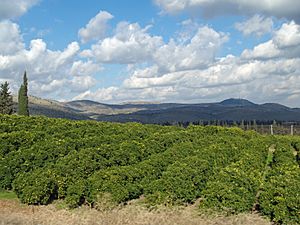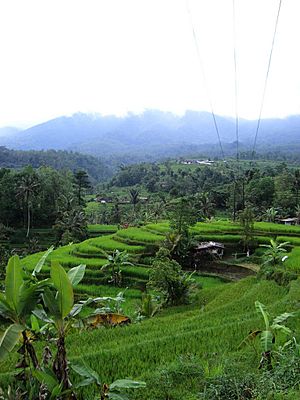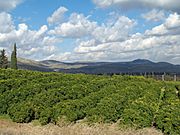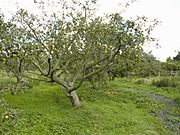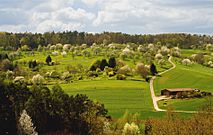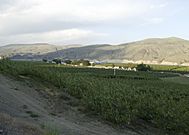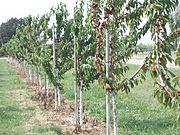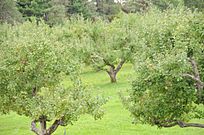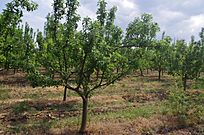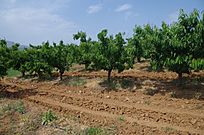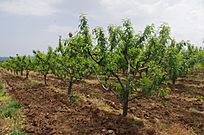Orchard facts for kids
An orchard is where trees or shrubs that produce food are grown. Fruit, nuts, and vegetables are grown in orchards. They are grown to be sold. Orchards are sometimes a part of large gardens. They are put there to look nice and to produce food.
Contents
Layout
An orchard's layout is the technique of planting the crops in a proper system. There are different methods of planting and thus different layouts. Some of these layout types include:
- Square method
- Rectangular method
- Quincunx method
- Triangular method
- Hexagonal method
- Contour or terrace method
For different varieties, these systems may vary to some extent.
Orchards by region
The most extensive orchards in the United States are apple and orange orchards, although citrus orchards are more commonly called groves. The most extensive apple orchard area is in eastern Washington state, with a lesser but significant apple orchard area in most of Upstate New York. Extensive orange orchards are found in Florida and southern California, where they are more widely known as 'groves'. In eastern North America, many orchards are along the shores of Lake Michigan (such as the Fruit Ridge Region), Lake Erie, and Lake Ontario.
In Canada, apple and other fruit orchards are widespread on the Niagara Peninsula, south of Lake Ontario. This region is known as Canada Fruitbelt and, in addition to large-scale commercial fruit marketing, it encourages "pick-your-own" activities in the harvest season.
Murcia is a major orchard area (or la huerta) in Europe, with citrus crops. New Zealand, China, Argentina and Chile also have extensive apple orchards.
Tenbury Wells in Worcestershire has been called The Town in the Orchard, since the 19th century, because it was surrounded by extensive orchards. Today, this heritage is celebrated through an annual Applefest.
Central Europe
Streuobstwiese (pl. Streuobstwiesen) is a German word that means a meadow with scattered fruit trees or fruit trees that are planted in a field. Streuobstwiese, or a meadow orchard, is a traditional landscape in the temperate, maritime climate of continental Western Europe. In the 19th and early 20th centuries, Streuobstwiesen were a kind of a rural community orchard that were intended for productive cultivation of stone fruit. In recent years, ecologists have successfully lobbied for state subsidies to valuable habitats, biodiversity and natural landscapes, which are also used to preserve old meadow orchards. Both conventional and meadow orchards provide a suitable habitat for many animal species that live in a cultured landscape. A notable example is the hoopoe that nests in tree hollows of old fruit trees and, in the absence of alternative nesting sites, is threatened in many parts of Europe because of the destruction of old orchards.
- Orchard in various regions
-
A community apple orchard originally planted for productive use during the 1920s, in Westcliff on Sea (Essex, England)
-
Apple orchards in Azwell, Washington surrounding a community of pickers' cabins
-
Sour cherry orchard on Lake Erie shoreline (Leamington, Ontario)
Historical orchards
- Orchard House in Concord, Massachusetts was the residence of American celebrated writer Louisa May Alcott.
- Fruita, Utah part of Capitol Reef National Park has Mormon pioneer orchards maintained by the United States National Park Service.
Modern orchards
Historical orchards have large, mature trees spaced for heavy equipment. Modern commercial apple orchards, by contrast and as one example, are often "high-density" (above 150 trees per acre) and in extreme cases have up to 9000 trees per acre. These plants are no longer trees in the traditional sense, but instead resemble vines on dwarf stock and require trellises to support them.
-
Pear orchard in Sirkovo, North Macedonia
-
Cherry orchard in Sirkovo, North Macedonia
-
Peach orchard in Sirkovo, North Macedonia
Images for kids
See also
 In Spanish: Huerto frutal para niños
In Spanish: Huerto frutal para niños


